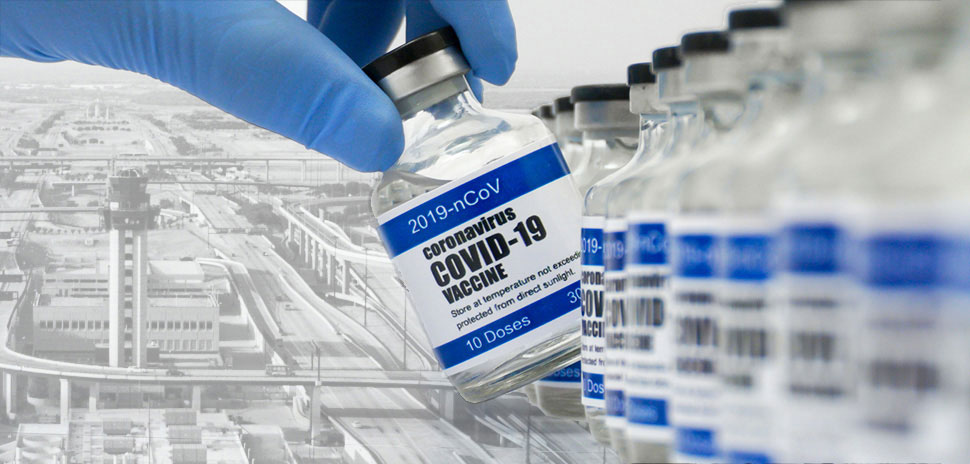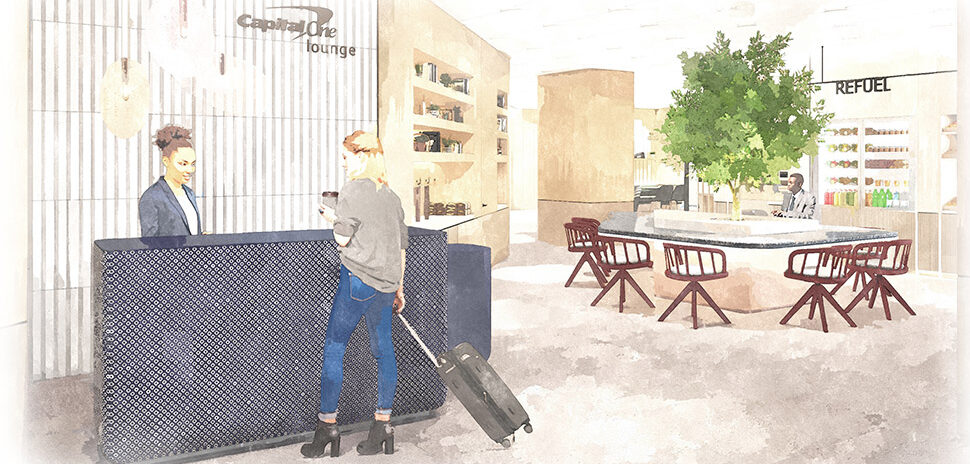As COVID-19 vaccines move toward regulatory approval, the air cargo industry is preparing for what has been called the “biggest product launch” in history. Cargo has undoubtedly been the silver lining for the airports and airlines during the pandemic. Now, they are poised to play an even more critical role in the transport and distribution of vaccines that require storage at extremely low temperatures.
The Dallas region’s central location, transportation infrastructure, and connectivity—combined with DFW International Airport and American Airlines’ cargo network and expertise in handling time- and temperature-sensitive products—make North Texas the ideal gateway for this massive logistical effort.
Cargo and Cold Chain Infrastructure
DFW International Airport’s cargo operations serve 22 major cargo hubs throughout Asia, Europe, the Middle East, and the Americas. DFW handles 54% of air cargo from Texas, generating more than $20 billion and accounting for nearly 55% of the airport’s total annual regional economic impact.
DFW opened its cold chain facility in October 2017, enabling it to handle temperature-sensitive products ranging from fruits, flowers, and fish, to pharmaceutical and life sciences products. Since then, the airside cold chain facility experienced a 20% increase in pharma shipments.
“DFW Airport is proud to be one of just two airports in the U.S. to obtain IATA CEIV Pharma community status,” said Milton De La Paz, DFW International Airport Vice President of Airline Relations and Cargo Business Development. “DFW is also the first airport in North America to have both an IATA CEIV Pharma community and a cloud-based air cargo community system, which enables collaborative data sharing of cargo shipments across all stakeholders in the supply chain.”
American Airlines has been delivering life-saving medicine for more than 80 years with a team that is specially trained in cold chain shipments. The airline has also been transporting large volumes of personal protective equipment (PPE), medical equipment, test kits, and other pharmaceuticals needed to combat COVID-19.
American owns temperature-controlled facilities in 56 U.S. cities and 22 facilities in Europe, Latin America, Asia, and Australia. With the strength of American’s network and presence of other international carriers, cargo capacity is available to more than 200 destinations across the 24 passenger airlines the airport services.
Complex Pharmaceutical Supply Chain
Pharmaceutical and life sciences is the fastest-growing sector and holds perhaps the highest value in the global air transportation industry. Meeting each product’s requirements and maintaining its integrity through the supply chain are the biggest challenges yet. Pharmaceutical products can be exposed to different climates, and the highest risk for temperature fluctuations are typically at airports.
“The IQVIA Institute for Human Data Science estimates the biopharma industry loses approximately $35 billion annually as a result of failures in temperature-controlled logistics,” said De La Paz. “CargoSense estimates that 20% of temperature-sensitive products are damaged during transport due to a broken cold chain. DFW Airport is working with the life sciences sector and air transportation industry to improve safety and ensure the cold chain is unbroken throughout the end-to-end process.”
The pharma supply chain includes the manufacturer of the vaccine, logistics service providers, trucking companies, airlines, airports, destination forwarders, and distribution centers. From there, the vaccine is transported to administration sites such as hospitals, clinics, and health care facilities where the vaccines are administered.
“To exercise our preparedness, American Airlines has partnered with others to conduct test flights, giving us a chance to run through the vaccine transportation procedure and make the process as efficient as possible,” said Roger Samways, American Airlines Vice President of Commercial Cargo. “The task that lies ahead requires all players across the cargo and pharmaceutical industries to work together to deliver effectively and efficiently.”
Harmonized handling procedures and strong cooperation among all logistical players are crucial to the successful transport and distribution of vaccines. It also entails having both the physical and digital infrastructure. DFW’s Cargo Cloud provides a slot booking app for truckers to reduce downtime and emissions at airports. Through the Global Pharma tracker, the airport can also monitor pharma product temperatures from origin to destination.
“After our recent shipment of COVID-19 vaccine trials, we met with those responsible for the manufacturing and distribution of the vaccine to identify how we can change our flight schedule and improve transportation time for the return of specimen samples by 24 hours,” said Samways. “That is a huge amount of time savings to ensure quick arrival to a research facility.”
Regional and Global Distribution Preparations
DFW Airport is poised to serve as a hub connecting vaccine manufacturing sites in Asia, South Asia, and Europe with Latin America. As American Airlines’ largest hub, DFW links cargo with freight forwarders and moves products through nearly 580 connecting flights each day. Since March, American Airlines has increased its capacity through the development of a cargo-only aircraft network. The airline is on track to operate its 5,000th cargo-only flight before year’s end.
“Even with these capabilities, the priority is to move vaccines between the aircraft and the vaccine distributor or forwarder as quickly and efficiently as possible without the need for much storage time in between,” said Samways. “The goal is for vaccines to be in our facilities no longer than a few hours.”
To prepare for the movement of vaccines, American Airlines has held multi-departmental taskforce meetings with representatives from American’s Cargo, Safety and Security, Fleet Engineering, Flight Operations, Network Planning, and Government Affairs divisions. The task force is preparing for a wide range of scenarios and potential service needs, including shipping and requirements for vaccine distribution to rural communities.
More on COVID-19 Vaccine Progress
- Centers for Disease Control and Prevention (CDC): Vaccines
- National Academies of Sciences, Engineering, and Medicine: Framework for Equitable Allocation of COVID-19 Vaccine
- The New York Times Vaccine Tracker
- Texas Department of State Health Services (DSHS) COVID-19 Distribution Plan
- Texas DSHS COVID-19 Vaccination Plan
A version of this story first appeared on the Dallas Regional Chamber site. Dallas Innovates is a collaboration of D Magazine Partners and the Dallas Regional Chamber.
![]()
Get on the list.
Dallas Innovates, every day.
Sign up to keep your eye on what’s new and next in Dallas-Fort Worth, every day.





























